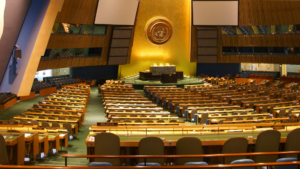The 2019 Imperial Springs International Forum, jointly organized by the Australia China Friendship and Exchange Association, the Chinese People’s Association for Friendship with Foreign Countries, the People’s Government of Guangdong Province and the World Leadership Alliance-Club de Madrid, was held at the Imperial Springs International Conference Center, Guangzhou, China from December 1 to 2, 2019. Vice President Wang Qishan of People’s Republic of China attended and addressed the Forum, highlighting the Forum’s theme of Multilateralism and Sustainable Development
During the one-and-a-half-day session, participating guests from various countries exchanged views and reached broad consensus as follows:
- 1. We congratulate China on the 70th Anniversary of the Founding of the People’s Republic of China and the significant achievements made by China and the Chinese people in this period.
- 2. Many of the challenges that humans are facing are global and increasingly interrelated. The international community should actively defend multilateralism, support the United Nations and its central role in the multilateral system and take effective, joint measures to enhance and strengthen global partnerships. As a staunch supporter of global partnerships and multilateralism, China launched the Belt and Road Initiative (BRI) in 2013 as a cooperative arrangement to advance infrastructure and enhance global interconnectivity around the world and is increasingly proposing it as a means of jointly addressing global challenges, promoting common development and contributing to build a community with a shared future for mankind.
- 3. The 2030 Agenda for Sustainable Development opened a new chapter of global cooperation and development. All countries and stakeholders have set poverty eradication, the elimination of hunger, the provision of quality education and urgent, coordinated climate action as priorities. We value China’s decision to adopt sustainable development as its core national policy and to implement Agenda 2030 comprehensively and thoroughly.
- 4. The international order is in a critical inflection point. Practical action to ensure an inclusive and interactive system of global governance, promote peace and security and advance development and balanced prosperity is urgently needed. Our multilateral structures and systems need to be reformed to restore an international order that is better fit for purpose in present circumstances, able to promote economic growth, reduce poverty and inequality, and ensure global security. The international order must clarify the values and norms that will enable our coexistence while respecting our cultural differences; strengthen the observance of international law; improve the quality of global governance and the effectiveness and legitimacy of its institutions and develop improved interconnectivity, based on technologies of the 21st century while respecting the ethical foundations of our universal humanity.
- 5. We appeal to all national governments, parliaments, civil society and citizens across the globe to engage in the dialogue and exchanges that will be advanced through the UN@75 initiative and enthusiastically support the UN Secretariat in the establishment of an Open Working Group to boost the implementation and results of UN@75, especially as they serve to enhance multilateralism and global cooperation, advance the achievement of a renewed international order and contribute to building and securing ‘The Future We Want’.

